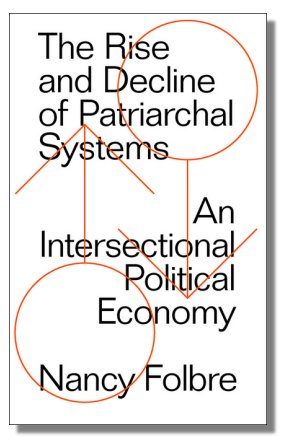John Stuart Mill was among the foremost liberal thinkers of modern times who wrote extensively…
Necessity is the Mother of Coalition: On Nancy Folbre Book Review by Jayati Ghosh

Author: Nancy Folbre
Publisher: Verso Books
ISBN: 9781786632951
Nancy Folbre’s new book, The Rise and Decline of Patriarchal Systems: An Intersectional Political Economy is a distillation of a lifetime of research and thinking about patriarchy and its economic and social manifestations and effects. Over decades, Folbre has provided insights into the various structures and implications of gender construction of economies and societies, particularly with regard to how the care burden is distributed. These ideas coalesce into an approach towards understanding how patriarchal systems have shaped economies, polities and societies through history, and how they affect our current reality in different parts of the world.
The novelty of Folbre’s approach is that it is fundamentally “intersectional” in its analytical framework. It focuses on intersecting and overlapping forms of exploitation that cannot be easily explained or pigeonholed into either neoclassical economics or traditional Marxian political economy. It is therefore a critique of the argument by Friedrich Engels that many socialist feminists were effectively brought up on, that the original sin responsible for gender inequality was the rise of private property in early class-based societies. She implicitly prefers the prior argument of August Bebel (which Engels sought to contradict) that inequalities based on class and gender were parallel, rather than sequential, phenomena: both resulting from the violent imposition of coercive laws and norms that favoured the more powerful.
Patriarchal norms of control predate private property, because they are concerned with the ability to control women’s labour power, specifically the labour directed towards social reproduction. This is the essential feature that then determines the different and intersectional ways in which such control is exercised. The historical specialisation of women in care activities (which is only partly determined by physical attributes like child bearing) have served through history to resolve tensions between individual and group welfare, because social reproduction and care are universal necessities creating tasks that must be performed. But this specialisation and the associated gendered division of labour not just within homes but across society has been costly for women, in many ways.
Folbre draws on the ancient history of different cultures to point out that patriarchal forms of control created forms of subordination and exploitation that were parallel to and intertwined with other forms of control based on class, ethnic or other socially defined differences (like caste). She notes, for example, the evidence that the enslavement of women both preceded and informed the enslavement of men. Folbre’s sweeping historical scope allows her to comment on how this has played out in other historical contexts as well. She considers colonialism as an extension of intergroup conflict in which gender once again played a critical part.
Women in completely different contexts therefore share common interests, many of which grow out of this historical specialisation in reproductive activities. While the basic terms of “the patriarchal bargain” as Folbre describes it are shaped by many factors and contingent on specific circumstances, there is an underlying commonality that is determined by the affective element in care work. The emotional content of care renders women more vulnerable: bargaining power is dramatically reduced when the ability to withhold something (in this case, care) is reduced because it would affect those whom women care about, in addition to caring for. There is a critical interplay between these two notions of care, which reduces women’s ability to bargain and therefore makes them more vulnerable to exploitation.
Women therefore effectively collude in their own disempowerment, because they care about those whom they care for. This in turn affects so many other aspects of women’s lives, resulting in greater confinement within homes, less mobility, worse labour market conditions, occupational segregation with concentration in disadvantaged activities, less political power, reduced social voice, and much else. Conversely, there is a “patriarchal dividend” to those who do less care work, which reinforces their relative power, superior social and economic status, political control.
It is inevitable that capitalist systems would also make use of this vulnerability. Folbre points out that “Patriarchal and capitalist institutions have this in common: they are both institutional structures that disempower those who invest in the capabilities of other people, putting women at a particular disadvantage.” Gender essentialism is simultaneously costly for women and advantageous for capitalist development. But this also spans different socio-economic systems and cultures, as the examples of women’s role in the Soviet Union or the welfare state’s use of women indicate.
Folbre’s title is optimistic, alluding to the current indications of some decline in the more obstructive elements of patriarchal systems, at least in some societies. Lower fertility in advanced economies for example, tends to weaken patriarchal institutions. Yet intersectionality and potentially conflicting interests of women have also come to the fore, as suggested by Folbre’s descriptions of the complex interactions between religious, race, class, caste and national identities on the one hand and gender inequalities on the other, and how these can lead to the suppression of gender concerns in what are seen as the “larger interest” in a particular context.
The decline of patriarchal systems would involve the eventual fall of one of the most resilient social constructs in human history. This could be seen as an example of optimism of the will, and Folbre’s clear-eyed analytical perspective and wide historical sweep do not allow for rose-tinted glasses. But, as she notes, bargaining over reproduction inevitably involves bargaining over production, which in turn can bring about the coalescence of otherwise potentially competing forces. In a memorable phrase, she points out that necessity can be the mother of coalition. Such coalitions can be successful only if the intersecting nature of oppression and vulnerability is truly understood, which is what makes Folbre’s contribution to our understanding so significant and so necessary.
